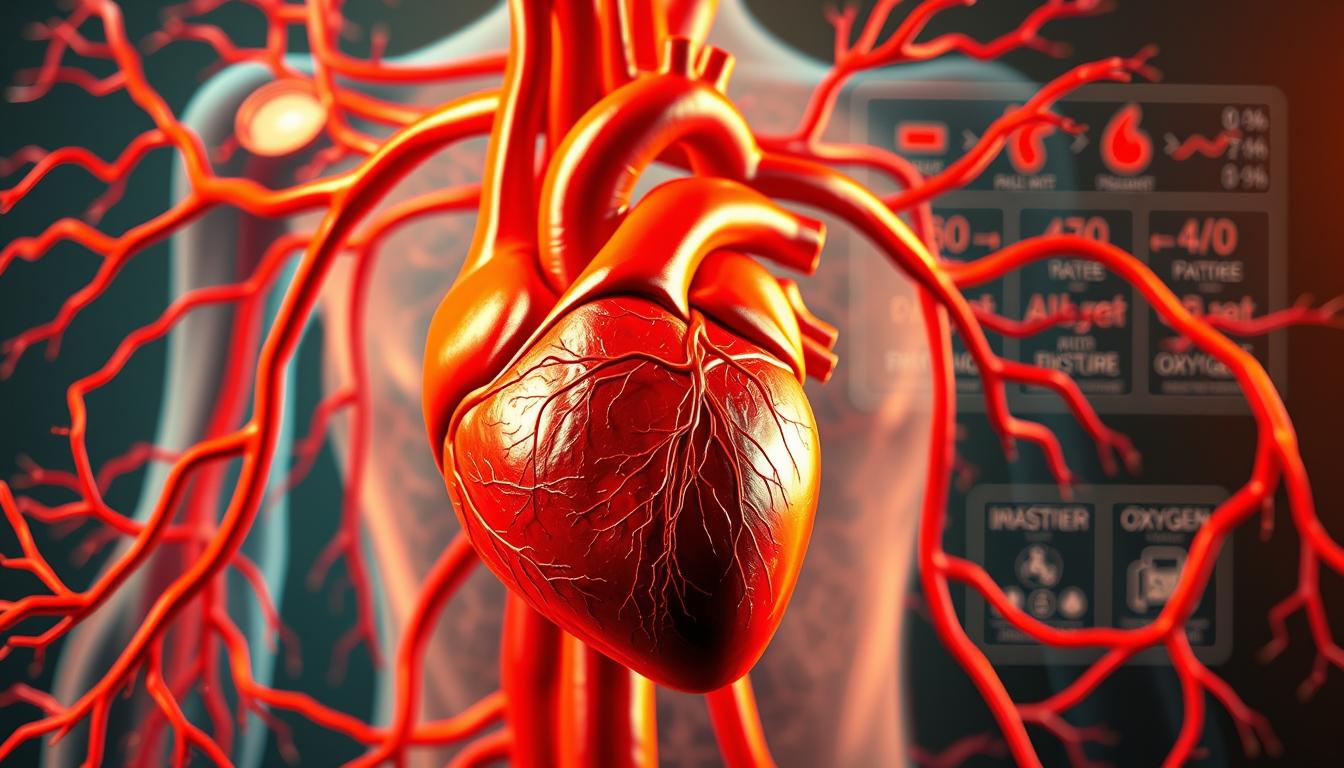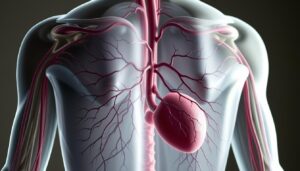Cardiovascular diseases are a huge problem, causing 17.9 million deaths every year. This is almost one-third of all deaths worldwide1. Your arterial health is key to living a long, healthy life and performing at your best.
Being fit isn’t just about working out. It’s about how well your body can function at its best. Things like high blood pressure, cholesterol, and diabetes can harm your health without you even knowing1. It’s important to understand and manage these risks to keep your arteries healthy.
Exercise is a strong ally for your heart and blood vessels. Doing moderate exercise can make your heart and blood vessels stronger. This can help prevent serious health problems1. Your arterial health affects your energy, how long you can keep going, and your overall well-being.
Key Takeaways
- Cardiovascular diseases are a leading global health challenge
- Arterial health is critical for peak performance
- Regular exercise plays a vital role in maintaining cardiovascular fitness
- Risk factors can be managed through proactive health strategies
- Understanding your body’s cardiovascular system is key to long-term wellness
Understanding Arterial Health Fundamentals
Your body has a complex network of blood vessels. This network is key to keeping you healthy. Knowing how arteries work is vital for your well-being1.
Cardiovascular diseases are a big problem worldwide. They cause 17.9 million deaths each year, which is 32% of all deaths1. This shows how important it is to know about your artery health.
Structure of Healthy Arteries
Arteries are more than just tubes. They are complex systems that carry blood well. They have three main layers:
- Intima: Inner layer protecting blood flow
- Media: Muscular middle layer controlling vessel diameter
- Adventitia: Outer protective layer supporting vessel integrity
Key Components of the Arterial System
The arterial system is crucial for your heart health. Each part works together to keep blood flowing and nutrients reaching your body.
“Health is not just the absence of disease, but the optimal functioning of your body’s intricate systems.” – Cardiovascular Research Institute
Role of Arterial Health in Overall Wellness
Keeping your arteries healthy is key to avoiding big health problems. Things like high blood pressure, diabetes, and smoking can harm your heart1.
By taking care of your arteries, you’re looking after your future health. This helps avoid heart issues down the line.
Blood Pressure Management and Arterial Wellness
Understanding blood pressure control is key for good arterial health. Your heart needs effective ways to prevent high blood pressure. These methods should be more than just what doctors usually suggest2.
Recent studies show new ways to keep arteries healthy. A study found that tai chi is great for blood pressure. People who did tai chi saw their blood pressure drop by an average of −7.01 mm Hg. This was more than those who exercised aerobically2.
- Monitor blood pressure regularly
- Practice stress-reduction techniques
- Maintain a balanced diet
- Engage in consistent physical activity
Prehypertension is when your blood pressure is between 120-129 mm Hg systolic and 80-89 mm Hg diastolic. Hypertension is when it’s 140/90 mm Hg or higher2. Knowing these numbers helps you take charge of your heart health.
Here are some tips for managing blood pressure:
- Limit sodium intake to less than 2,300 mg daily2
- Maintain a healthy weight
- Follow a Mediterranean-style diet
- Exercise for at least 150 minutes weekly2
Even small changes can make a big difference. Losing just 10 pounds can help your blood pressure. It shows that small steps can lead to big improvements in heart health2.
The Impact of Lifestyle on Arterial Function
Your lifestyle greatly affects your arterial health. Knowing how daily choices impact your heart can help you stay healthy and perform well3.
Arterial function is linked to your daily habits. This includes exercise, what you eat, and managing stress. These factors work together to keep your heart and blood vessels healthy and efficient.
Exercise for Arterial Health
Exercise is key to better arterial function. It’s not just about cardio. Different activities help your blood vessels stay healthy:
- Aerobic exercises like cycling and swimming
- Strength training to support circulation
- Flexibility workouts that promote blood flow
Studies show that regular exercise can make your arteries less stiff and improve heart function3. Aim for at least 150 minutes of moderate exercise each week.
Heart-Healthy Diet Considerations
Eating right is vital for your arteries. Choose foods that are good for your blood vessels:
- Omega-3 rich fish
- Leafy green vegetables
- Whole grains
- Lean proteins
What you eat can greatly affect your artery health.
Stress Reduction Techniques
Reducing stress is crucial for healthy arteries. Stress can harm your heart, making it important to manage it well.
Effective stress management supports overall cardiovascular wellness.
Try stress-reducing activities like meditation, deep breathing, and exercise. These can help your arteries and improve your overall health.
The Pulse of Life: Mastering Arterial Health for Peak Performance

Optimizing arterial health is the first step to reaching peak cardiovascular performance. Your body’s arteries are key in delivering oxygen and nutrients. This directly affects your fitness and wellness4.
Arterial fitness is more than just exercise. It’s about a full approach to heart health. Cardiopulmonary exercise testing (CPET) is a powerful tool for checking how your body reacts to exercise4.
- Measure your cardiovascular capacity through advanced diagnostic techniques
- Track oxygen uptake and heart rate during physical activities
- Understand your body’s metabolic transition points
Peak cardiovascular performance isn’t just about hard workouts. It’s about knowing how your arteries handle stress. Pulse Wave Velocity (PWV) analysis gives important insights into your artery stiffness and heart health3.
By focusing on arterial health, you can:
- Improve exercise efficiency
- Enhance oxygen delivery to muscles
- Reduce risk of cardiovascular complications
“Your arteries are the highways of health, and optimizing their function is key to peak performance.”
Using advanced monitoring and understanding your body’s heart responses can change your fitness and wellness approach43.
Advanced Monitoring Techniques for Arterial Health
Tracking your arterial health has become more advanced with modern tools. These tools give deep insights into your vascular system. This is key to knowing your overall health and any risks.
Monitoring arterial health has changed how we care for our hearts. Today’s diagnostic tools are very precise in checking how well your blood flows5. With more people facing heart problems, it’s clear that tracking your health closely is vital5.
Modern Diagnostic Approaches
Doctors now use the latest methods to check heart health. One important tool is pulse wave velocity (PWV). It’s a non-invasive way to see how stiff your arteries are3.
- 24-hour ambulatory blood pressure monitoring
- Advanced pulse wave velocity analysis
- Bioimpedance artery pulse signal tracking
Tracking Technologies for Personal Health
To understand your arterial health, you need advanced but easy-to-use tech. Healthy people’s PWV usually falls between 4.08 m/s to 8.26 m/s3. This number tells a lot about your heart health.
| Monitoring Technique | Accuracy | Key Benefit |
|---|---|---|
| Pulse Wave Velocity | 95% Correlation | Arterial Stiffness Assessment |
| Ambulatory BP Monitoring | Gold Standard | Comprehensive Cardiovascular Evaluation |
Understanding Pulse Wave Velocity
Pulse wave velocity is a top-notch way to check heart health. It measures how fast blood pressure waves move through your arteries. This helps doctors spot risks early3.
Today’s tech lets us monitor your arteries well without much invasion. These advanced methods help you stay on top of your heart health.
Preventing Arterial Disease Through Proactive Care
Keeping your heart healthy means taking steps to prevent arterial disease. High blood pressure is a big risk factor. So, it’s key to take care of your health early on.
Many things affect your artery health. Knowing these can help you lower your heart disease risk:
- Regular health screenings
- Comprehensive lifestyle modifications
- Early intervention techniques
- Personalized risk assessment
Doctors say a full plan is best for your arteries. Prevention is always more effective than treatment. Catching risks early can stop serious heart problems.
| Risk Factor | Prevention Strategy | Impact Level |
|---|---|---|
| High Blood Pressure | Regular monitoring, diet control | High |
| Cholesterol Levels | Exercise, balanced nutrition | Medium |
| Stress | Meditation, stress management | Medium |
Being proactive can change your heart health for the better. Know your risks and act on them. This way, you can keep your arteries healthy and improve your life.
“Prevention is the best medicine for maintaining healthy arteries” – Cardiovascular Research Institute
Important note: Your artery health gets better with the right care. Begin your prevention journey now.
Optimizing Circulation for Enhanced Performance
Your body’s circulation is key to your physical and mental health. Improving blood flow can boost your overall health and energy.
Improving circulation is more than just moving around. It’s about finding ways to help your blood flow better. Learning the right methods can unlock your body’s full potential.
Circulation-Boosting Strategies
- Practice dynamic stretching to make blood vessels more flexible
- Try interval training to get your heart rate up
- Wear compression gear to help blood flow6
- Drink plenty of water to keep blood flowing well
Recovery Techniques for Vascular Health
Good vascular recovery means using smart strategies for your blood system. Measuring blood pressure can be very accurate, giving you insights into your heart health7.
- Get regular massages
- Use active recovery methods
- Try foam rolling to ease muscle tightness
Performance Enhancement Through Better Blood Flow
Better circulation means better physical and mental performance. Heart health is vital, with heart diseases causing 32% of deaths worldwide6. By focusing on blood flow, you can lower these risks.
- Stick to a regular exercise routine
- Reduce stress
- Eat foods that are good for your blood vessels
Start your journey to better performance by understanding your circulatory system. Use these tips to reach your full potential and keep your blood vessels healthy.
Innovative Treatments and Future Perspectives
The field of arterial health is changing fast, with new treatments on the horizon. Nuclear cardiology has become more advanced, giving us deeper insights into heart health8. These new therapies are changing how we deal with heart disease.

Recent breakthroughs have brought us closer to better diagnosis and treatment:
- Advanced imaging shows detailed blood flow patterns8
- New pulse wave velocity analysis for heart risk9
- Advanced tools for heart diagnosis
Pulse Wave Velocity (PWV) is key in predicting heart problems. Scientists have found ways to measure PWV with high accuracy, even at lower speeds9. For people aged 30-39, a healthy PWV range is between 4.08 m/s and 8.26 m/s, helping doctors diagnose better9.
The future of heart care is about precision, personalization, and new tech.
Nuclear cardiology is also advancing, with better cameras, tracers, and image tech8. These improvements mean we can diagnose and treat heart and artery issues more accurately.
Conclusion
As you’ve explored the world of arterial health, you’ve found key ways to boost your heart health. You learned that your arteries are more than just passageways. They are a dynamic network that’s vital for your best performance7.
Your arteries’ health affects your overall well-being and potential7. This is a crucial fact to remember.
Studies show how our arteries change as we age. Aortic wave velocity increases a lot from age 20 to 100. This shows why taking care of your heart is so important7.
Being physically fit is also key to good artery health. People who stay active have better artery function7.
Your journey to learn about arterial health is a big step. By following the tips we discussed, like exercising and eating right, you can improve your heart health. Every choice you make affects your arteries, helping you reach your full potential7.
It’s time to take action. Your artery health is a sign of your overall energy and health. Begin today by using what you’ve learned. Make choices that help your heart. Your future self will thank you for it.
FAQ
What are arteries and why are they important for my health?
How can I tell if my arterial health is good?
What lifestyle factors most significantly impact arterial health?
How does exercise benefit my arterial health?
What foods are best for maintaining healthy arteries?
Can stress really affect my arterial health?
What are some early warning signs of potential arterial issues?
How often should I get my cardiovascular health checked?
Can arterial health be improved at any age?
What technological advancements are helping monitor arterial health?
Source Links
- A Comprehensive Review of Cardiovascular Disease Management: Cardiac Biomarkers, Imaging Modalities, Pharmacotherapy, Surgical Interventions, and Herbal Remedies – https://pmc.ncbi.nlm.nih.gov/articles/PMC11394358/
- Tai Chi Better Than Aerobics to Lower Blood Pressure – https://www.healthline.com/health-news/want-to-lower-your-blood-pressure-tai-chi-may-work-better-than-aerobics
- Arterial Pulse Wave Velocity Signal Reconstruction Using Low Sampling Rates – https://pmc.ncbi.nlm.nih.gov/articles/PMC10887207/
- Practical guide to cardiopulmonary exercise testing in adults – Respiratory Research – https://respiratory-research.biomedcentral.com/articles/10.1186/s12931-021-01895-6
- Optimizing observer performance of clinic blood pressure measurement: a position statement from the Lancet Commission on Hypertension Group – https://pmc.ncbi.nlm.nih.gov/articles/PMC6686964/
- A Comprehensive Review of Cardiovascular Disease Management: Cardiac Biomarkers, Imaging Modalities, Pharmacotherapy, Surgical Interventions, and Herbal Remedies – https://www.mdpi.com/2073-4409/13/17/1471
- Pulse wave analysis – PMC – https://pmc.ncbi.nlm.nih.gov/articles/PMC2014492/
- Innovation in Cardiac Imaging – Sources of Medical Technology: Universities and Industry – https://www.ncbi.nlm.nih.gov/books/NBK232039/
- Arterial Pulse Wave Velocity Signal Reconstruction Using Low Sampling Rates – https://www.mdpi.com/2079-6374/14/2/92




